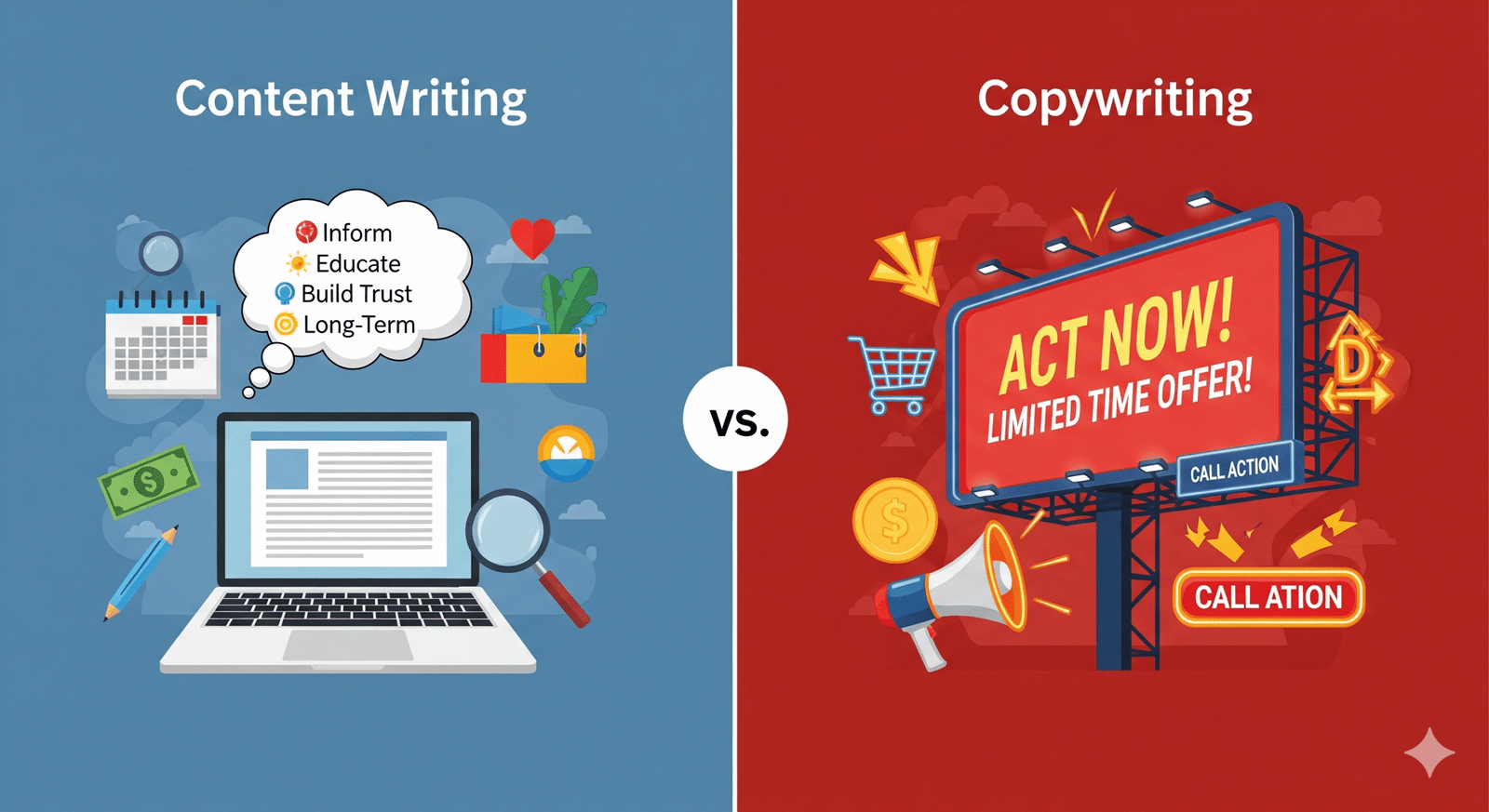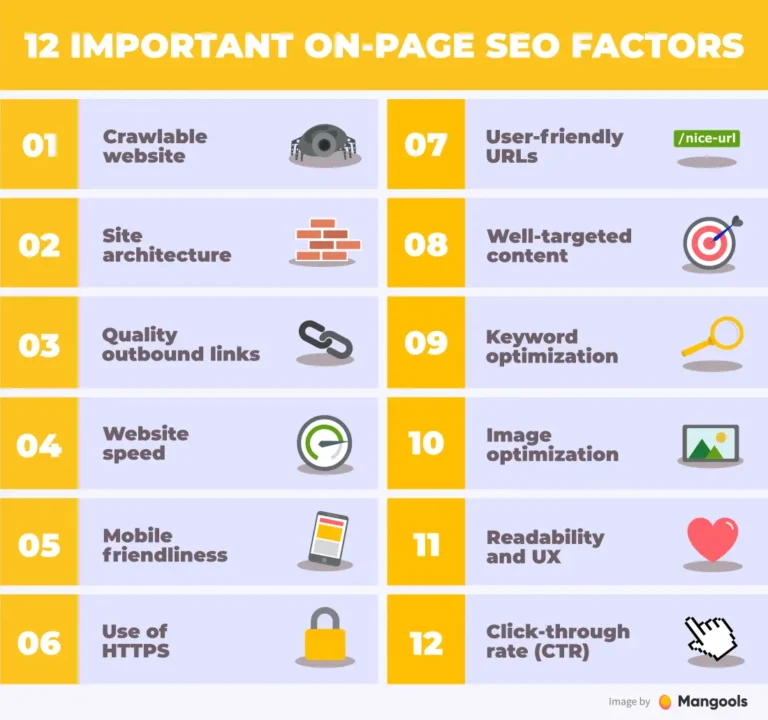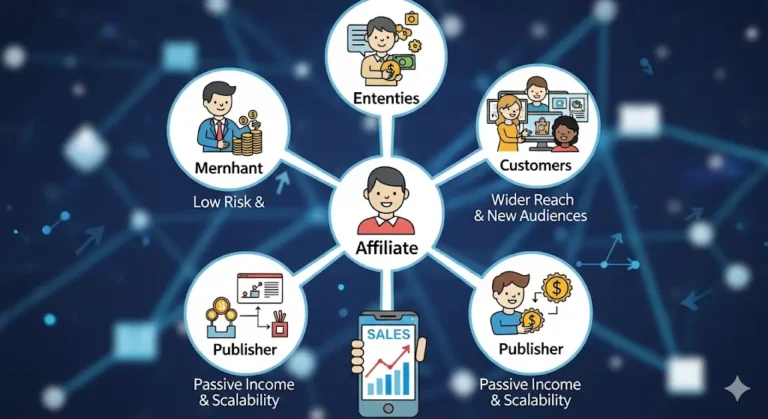Difference Between Content Writing and Copywriting

Difference Between Content writing and Copywriting ,When it comes to digital marketing, many professionals and beginners struggle to understand the. Though both involve writing, their purpose, style, and impact on business are very different. If you have ever debated content writing vs copywriting, this article will give you the complete picture.
What is Content Writing?
Content writing is about creating informative, engaging, and valuable content for readers. The aim is to provide knowledge, build trust, and establish authority.
Examples of content writing include:
- Blog posts and articles
- Case studies and whitepapers
- Website informational pages
- How-to guides and tutorials
- Social media posts that inform rather than sell
Content writing builds a brand’s long-term visibility in search engines and nurtures relationships with the target audience.

What is Copywriting?
Copywriting is sales-focused writing. Its primary goal is to persuade and drive action.This is the main difference between contentwriting and copywriting. Copywriters use psychology, emotions, and strong calls-to-action (CTAs) to influence readers.
Examples of copywriting include:
- Ad headlines
- Product descriptions
- Sales pages and landing pages
- Email campaigns
- Social media ads
Copywriting is short, powerful, and conversion-driven.
Content Writing vs Copywriting: Key Differences
The difference between content writing and copywriting lies in their objectives:
| Aspect | Content Writing | Copywriting |
|---|---|---|
| Goal | Educate, Inform, Engage | Persuade, Sell, Convert |
| Style | Informative, Descriptive | Persuasive, Emotional |
| Length | Long-form (blogs, guides) | Short-form (ads, CTAs) |
| Focus | SEO, Audience Trust | Conversions, Sales |
| Impact | Builds brand authority | Generates revenue fast |
Both are crucial—content writing attracts and educates, while copywriting convinces and sells.
Why Businesses Need Both
A successful digital strategy combines both.The difference between contentwriting and copywritng are:
- Content writing builds organic reach, improves SEO, and positions the brand as trustworthy.
- Copywriting transforms that trust into sales, sign-ups, and conversions.
For example:
A skincare brand may publish a content writing blog on “5 Tips for Glowing Skin Naturally.” At the same time, it may run a copywriting ad saying: “Get clear skin in 7 days – Buy Now!”

The Role of Storytelling in Content Writing
Storytelling makes content writing engaging. Instead of only giving information, content writers create relatable stories that readers connect with. This increases time on page, engagement, and loyalty.This is main difference between content writing and copywriting
The Psychology Behind Copywriting
Copywriting works because it taps into human psychology. It uses:
- Scarcity – “Only 2 seats left!”
- Urgency – “Offer ends today!”
- Power words – “Proven, Secret, Guaranteed”
- Emotions – “Feel confident in your skin again.”
These elements make readers take immediate action.
SEO in Content Writing vs Copywriting
- Content Writing: SEO is the backbone. Articles are keyword-optimized to rank higher. Writers focus on keyword placement, meta descriptions, and internal linking.
- Copywriting: SEO is used in headlines and ad texts but the main focus remains persuasion and click-through rate.
Both complement each other—content brings traffic, copy converts it.This is the main difference between content writing and copywriting.
Difference Between Content Writing and Copywriting in Career Paths
If you’re choosing a career in writing, the difference between content writing and copywriting is important to understand.
- Content Writers: Work in SEO agencies, media houses, or as bloggers. Skills needed include research, storytelling, and SEO knowledge.
- Copywriters: Work in advertising, marketing agencies, and product-based companies. Skills required include creativity, psychology, and persuasion.
Both careers are in high demand in 2025 and beyond.
Content Writing vs Copywriting in Real-Life Examples

- Content Writing Example: A detailed blog titled “How Digital Marketing Helps Small Businesses Grow”.
- Copywriting Example: A Facebook ad saying “Grow your business 10x with our digital marketing service – Start Today!”
Both connect to the same audience but serve different stages of the customer journey.
How to Choose Between Content Writing and Copywriting
- Use content writing when your goal is awareness and trust-building.
- Use copywriting when you want leads, conversions, and sales.
- Combine both for maximum results.
Conclusion
The difference between content writing and copywriting is clear: one educates, the other persuades. Brands that want to win in the digital space must use both. Together, they attract, engage, and convert audiences into loyal customers.
What is the main difference between content writing and copywriting?
The main difference lies in the purpose. Content writing educates and informs, while copywriting persuades and sells.
Which is better: content writing or copywriting?
Neither is better. Both are important—content builds long-term trust, while copywriting ensures immediate sales and conversions.
Can one person do both content writing and copywriting?
Yes. Many skilled writers can do both, but mastering one first helps build expertise.
Is content writing more focused on SEO than copywriting?
Yes. Content writing relies heavily on SEO for ranking, while copywriting focuses more on conversion techniques.
What pays more: content writing or copywriting?
Copywriting usually pays more because it directly drives revenue. However, expert content writers also earn well due to high demand.
Do startups need content writing or copywriting first?
Startups should begin with content writing to build visibility and credibility, then invest in copywriting to scale sales.
Can AI replace content writing and copywriting?
AI can assist with drafting, but human creativity, emotional connection, and strategy are irreplaceable in both fields.



